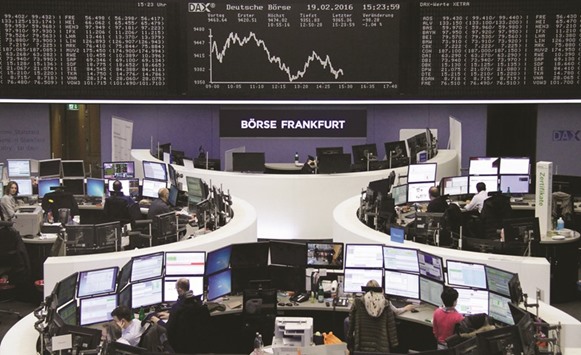World stocks slid yesterday, with the focus in Europe on British Prime Minister David Cameron seeking to put together a last-gasp deal to persuade Britons of their EU future.
As Cameron admitted there was “still no deal” coming towards the end of a second full day of negotiations in Brussels aimed at preventing a British exit from the European Union, continued oil price weakness also weighed on markets, which lost moderate ground.
London’s FTSE 100 index of top companies and Paris’ CAC 40 both shed 0.4% at the close at 5,950.2 points and 4,223.0 respectively, while the Frankfurt DAX fell 0.8% at 9,388.8 points. The Euro STOXX 50 was down 1.3% at 2,856.6 points at close.
The British pound fell to $1.4313 from $1.4335 late on Thursday, but steadied against the euro.
“The pound is likely to remain depressed until there is a some movement in Brexit negotiations; for the good or the bad,” noted CMC Markets analyst Jasper Lawler.
Equities were also depressed yesterday by Thursday’s falls on Wall Street.
World oil prices shed about 60¢ in midday London deals yesterday, with New York crude sitting just above $30 per barrel.
Dealers shrugged off upbeat data showing that British retail sales rallied 2.3% last month compared with December — the biggest increase in more than two years.
Wall Street was off in early trade as oil prices retreated and US inflation data boosted the odds of another Federal Reserve interest rate hike this year.
US Labour Department data showed flat US consumer prices in January, but a pickup of 0.3% in core inflation when volatile food and energy prices were stripped out.
That led Capital Economics to indicate that “if we are right, the Fed will find it increasingly hard to ignore evidence that core inflation is accelerating.”
Two hours into trade, the Dow Jones Industrial Average was at 16,375.18, down 0.2%, while the broad-based S&P 500 was off 0.3% but the tech-rich Nasdaq Composite Index overturned early lossed to add 0.4%.
Cameron is seeking to reach a deal on reducing welfare payments to EU migrants and opting out of a commitment to ever-closer union.
The British premier wants sweeping reforms to the 28-member bloc which he hopes will stop Britain from becoming the first nation to leave the EU in a membership referendum likely in June.
He has however hit opposition from France and Belgium over his bid to make clear Britain is not committed to ever-closer union and ensure that the City of London financial district is not bound by rules governing the euro single currency area.

Traders work in front of the DAX board at the Frankfurt Stock Exchange yesterday. The DAX fell 0.8% at 9,388.8 points.
